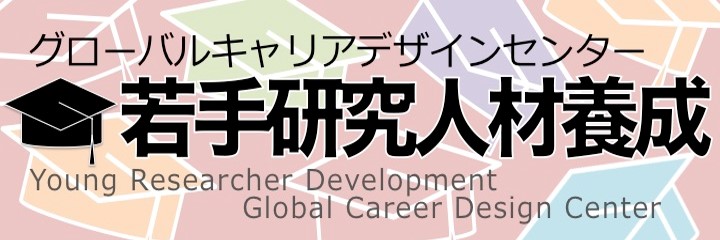University of the Philippines National Institute for Science and Mathematics Education Development(UP NISMED)[Republic of the Philippines]
January 17, 2008〜February 18, 2008
Gracuate School for International Development and Cooperation, Educational Development Course(M1)
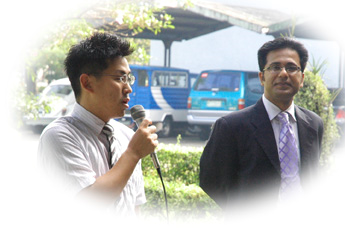
1)About the country of my internship
Republic of the Philippines is the country which is away only 480 km from Japan. It is shorter than the distance between Tokyo and Osaka. The Philippines consists of more than 7,000 islands and this is the second biggest number to Indonesia in the world. In addition, it is the world's third largest country in terms of English speaking population. There are more than 100 ethnic groups and around 80 kinds of different languages which mean that the Philippines is one of the multiracial countries in the world.
Eight out of ten people are Catholic. Currency unit is Peso. The Philippines is known as a very hot country; however because of its land shape which is vertically long, there exists a variety of climates depending on its place, latitude, altitude and time.
Historically, the Philippines was founded by Magellan and experienced Spanish dominion and USA dominion, and was under Japanese martial law.
2)About the local life and the culture
It is very difficult for me to describe what Filipino culture is because of its variety of culture. It was my second visiting the Philippines, and I felt a big disparity in terms of standards of their life. I guess it is because I stayed in a slum area in my first visiting; however I stayed inside of the University of the Philippines (UP) in this time. I can only say that the mixed life style such as mixed with the poor and the rich and with one culture and the other is one of the uniqueness of the Filipino culture.
I felt the same kind of atmosphere from UP. UP has a very close connection with the local people and local activities, and it is always open to the public. I could meet not only students, but also children, families, seniors, beggars, higher-ups and many others on the campus which is very uncommon feature in universities of Japan. I also saw a lot of street vendors and even a slum area on the campus. For me, I saw the Philippines at UP.
The life during the internship was quite comfortable. The hostel I stayed has air conditioner, hot water and good security system. Mostly I had meals in campus or at friend's house, and I usually had what the local people have in their usual life. You can easily get access to buy anything you want on campus or at big shopping mall near the campus. You can find dishes from other countries at the mall and of course you can find Japanese food as well! University students both male and female usually wear T-shirts and jeans.
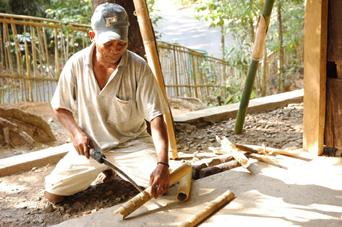
3)About the host institution
UP NISMED (University of the Philippines National Institute for Science and Mathematics Education Development) was established in 1964. It is one of the institutions belonging to UP working on curriculum and teaching/learning material development, in-service teacher training (INSET), and research and development for primary and secondary science and mathematics education.
JICA (Japanese International Cooperation Agency) constructed Science Teacher Training Center inside of the UP NISMED as a grant-aid in 1988, and from 1994 JICA have conducted a project under the name of SMEMDP (Science and Mathematics Education Manpower Development Program) to which some professors in Hiroshima University had dispatched.
Recently UP NISMED is expected to be a base spot for South-South Cooperation in order to conduct INSET not only for local people but also for participants from abroad.
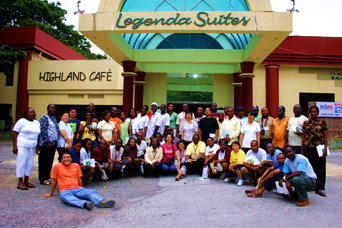
4)About the internship course
The program I joined is JICA's Third Country Training which is one of the South-South Cooperation projects. The full name of the program is Secondary Mathematics and Science Education for Kenyan INSET Trainers, and forty Kenyan Teachers (ten people in Mathematics, Physics, Chemistry and Biology respectively) had training at UP NISMED. As an intern, I joined the program as a participant, an observer and a staff.
Specifically, I was assigned in a group of high school chemistry, and I participated in lessons together with Kenyan teachers and I sometimes helped UP NISMED staff as an assistant, and I conducted one lesson for Kenyan teachers as well.
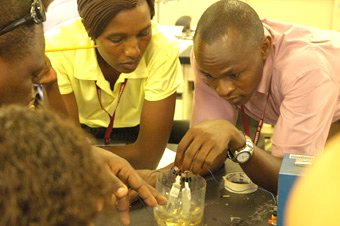
5)The most impressive experience during the internship
What I have got the most is that I was able to build and expand my own image for international educational cooperation. And I also have gotten two attendant fruits as follows:
One is the relationship with the UP NISMED staff, the Kenyan teachers and the local people I met. The relationship and the friendship that I shared with them will be lasting in my heart and they will be very special in my life. We are still in touch each other, and I wish to develop our relationship through the time.
The other is everything that I had learned newly on the spot. I know myself knows only some aspects of them and there are still a lot of other things that I should know. However things that I had learned were full of freshness and they are still stimulating me.
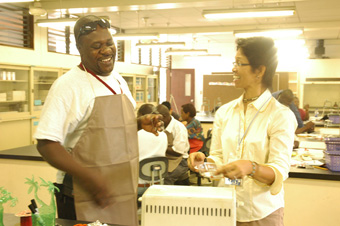
6)Expectations on my internship for the future carrier
My objective for this internship program was to experience one of the international educational cooperation projects on the spot with my own body and heart, and to develop my own opinion on it. I am satisfied to find myself achieved most of it. The idea that I have gotten from the internship will be a part of my viewpoint and be a cornerstone to take actions in international educational cooperation.
7)Pre-internship preparations and tips
I guess the program from UP NISMED has a bit different color from other programs. Therefore, following suggestions are only for this program.
As a preparation for the course, I advise to gather as much information as possible related to your activities and keep it in electronic files in English. Especially it is very helpful to consider and gather information that how your work assigned by UP NISMED can be adapted in your own country.
As for language, since their official language is English, speaking English is required as a minimum level. Also, in order to communicate with the local people, it is preferable to know at least some basic greetings in Tagalog (the local language). Since UP NISMED staffs are very kind and cooperative, you don't really need to worry about your English skill. However if you are willing to work with them in a more concrete level, certain English skill is required.
I can say that the most important thing is "communication". Building a good relationship with others through communication certainly affects what you do during your internship and also your satisfaction. I also advise to join local events and parties to make a progress to understand differences such as different people, different cultures, different thinking and so on. I brought my saxophone and I found that music is a common language for everyone.
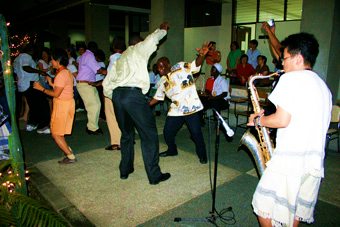
8)Others
I would like to express all my gratitude to UP NISMED staff and G.ecbo staff for giving me such a precious chance to visit the spot and an impressive experience. Their continuous support was a big stimulation for me. I hope a lot of you can take benefits from this internship program.
9)Advice for future interns
Comparing to other study tours, I think there are a lot of advantages to participate in G.ecbo program as a student of Hiroshima University. You can expect such a well organized content for each course and other attendant learning, its support system and a relationship with people concerned.
People, who like to challenge anything and learn more of the world, please do not miss this kind of valuable chance. It is time to act and experience the world!
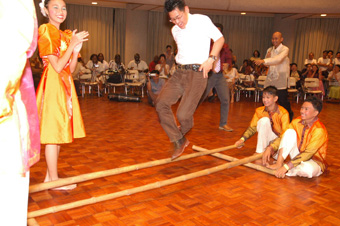

 Home
Home
